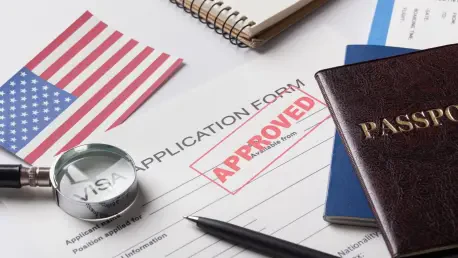As the world gears up for the 2026 FIFA World Cup, the anticipation is not only about the thrilling matches but also about whether the United States can navigate the challenges posed by its stringent immigration policies. The U.S., alongside Canada and Mexico, is set to host this prestigious event. Despite its global appeal, there is growing concern that the restrictive U.S. immigration stance may mar the tournament’s inclusive ideals. This comes against the backdrop of policies enacted under the Trump administration, which have raised barriers for international visitors. These policies threaten to conflict with FIFA’s mission of bringing together people from diverse cultural backgrounds through soccer. The juxtaposition of these ideals versus the reality of current U.S. immigration policies poses significant questions about accessibility and inclusivity for both international participants and fans set to attend the games.
Clash of Ideals and Policies
FIFA’s decision to award the 2026 World Cup to the United Bid of the U.S., Canada, and Mexico heralded a vision of unity and international cooperation. The tournament was advertised as the most expansive sports event, emphasizing inclusivity and positive change through football. Such ideals are encapsulated in FIFA’s Men’s World Cup Human Rights Strategy, accentuating the organization’s commitment to human rights. However, U.S. immigration policies, especially those stemming from executive orders that led to travel restrictions targeting specific nationalities, starkly contradict these ideals. Measures that stem from nationality-based exclusions, like the ban affecting Muslim-majority countries, challenge the event’s intended celebration. Although special provisions exist for athletes, the principle of exclusion remains troubling, particularly for nations confirmed to participate in the tournament. The presence of these barriers risks diluting FIFA’s efforts to foster international camaraderie and diminish the positive experience for fans and participants alike. Critics have highlighted how these immigration barriers may not only compromise the World Cup experience but could also infringe on FIFA’s human rights commitments. Additionally, policies targeting specific vulnerable populations, such as those affecting gender identity issues, pose further complications. Instances like the chaos seen in the aftermath of the 2017 travel ban suggest potential pitfalls as the events draw closer. Such historical precedents serve as cautionary tales, illustrating how bureaucratic inefficiencies could lead to unnecessary detentions or denied entries. These adversities could tarnish the reputation of the U.S. as a welcoming host nation and dissuade participants and fans from attending, even if they hold valid visas for the event.
FIFA’s Role and Responsibility
The World Cup presents FIFA with an opportunity to assert its stance on inclusivity and human rights actively. The role of FIFA President Gianni Infantino is critical in this context, as it involves balancing business interests with organizational principles. Critics argue that remaining silent in the face of discriminatory practices undermines FIFA’s own statutes, which emphasize fostering positive human rights impacts. Therefore, FIFA is urged to engage proactively with U.S. authorities to ensure equitable access for teams, supporters, journalists, and officials, irrespective of their nationality, religious beliefs, gender orientation, or political views. This requires an assertive position that aligns with the governing body’s stated ethics and human rights commitments. Beyond enhancing access, this approach would reinforce FIFA’s global reputation and responsibility to support international collaboration. Engaging in discussions for policy adjustments or accommodations aligns with the broader ethos of the World Cup as a unifying event. FIFA’s initiative to demand fair accessibility conditions marks a pivotal step in potentially reversing current U.S. policy stances on immigration, thus enhancing the inclusivity narrative that the World Cup promotes. However, should constructive policy negotiations falter, FIFA’s commitment to its mission could necessitate reevaluating the viability of the U.S. as a host nation.
Tensions in Global Sports and Future Considerations
The situation of the 2026 World Cup underlines a more extensive trend in the sporting domain, where global sports organizations that champion inclusivity face challenges from host nations with restrictive immigration policies. The tension projects a need for a thorough evaluation of such relationships to ensure that international sporting events are truly reflective of their foundational goals. Advocates argue that if policy reversals or necessary accommodations are not secured, alternative strategies should be considered, ensuring that the essence of the “beautiful game” is not compromised. These strategies could include exploring dynamic solutions or adjustments to logistical arrangements to guarantee broad access to the games without undermining international participation. Looking ahead, this scenario serves as a critical reference point for future events, prompting sports governing bodies to prioritize inclusivity from the onset of event planning. It also stresses the importance of integrating robust discussions on human rights and international cooperation within the framework and logistics planning of global sporting events. The engagement between sports entities and host countries must evolve towards a more inclusive future, avoiding obstacles that might detract from the sporting experience and its unifying spirit. By addressing these challenges, FIFA can reinforce its position as a leader in promoting a world where sports act as a transnational bridge, transcending geopolitical and cultural diversities.
Navigating the Complex Challenges
FIFA’s decision to award the 2026 World Cup to the United States, Canada, and Mexico was touted as a symbol of international unity and cooperation. Promoted as the most expansive sporting event, it was intended to showcase inclusivity and drive positive change through soccer. These lofty ideals are woven into FIFA’s Men’s World Cup Human Rights Strategy, underscoring the organization’s vow to uphold human rights. However, the U.S. immigration policies, such as the travel bans targeting certain nationalities, stand in stark contrast to these values. Restrictions based on nationality, like those impacting Muslim-majority countries, undermine the spirit of global celebration the event aims to foster. Even though athletes have special exemptions, these exclusions remain unsettling, especially for participating nations. Critics argue these policies could compromise the tournament experience and challenge FIFA’s human rights promises. Past scenarios, like the 2017 travel ban chaos, highlight how bureaucratic hurdles might lead to unnecessary detentions, damaging the U.S.’s image as a generous host and deterring fans and participants, even with valid visas.









